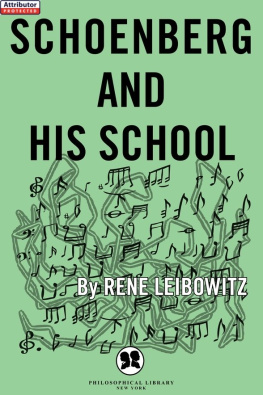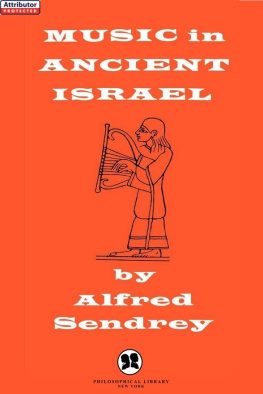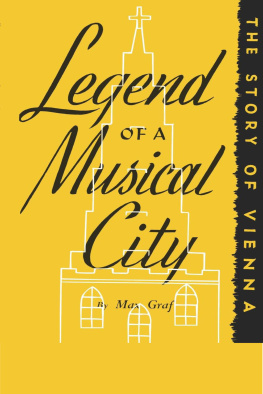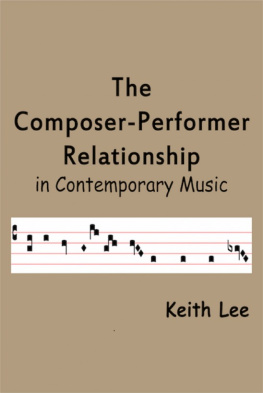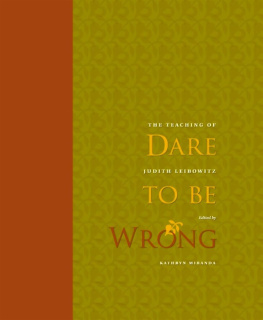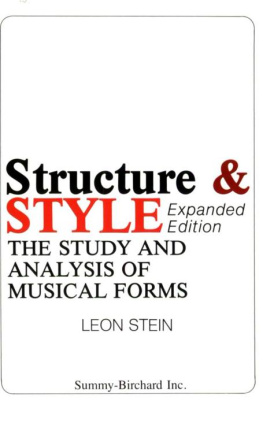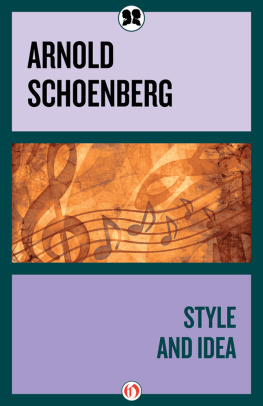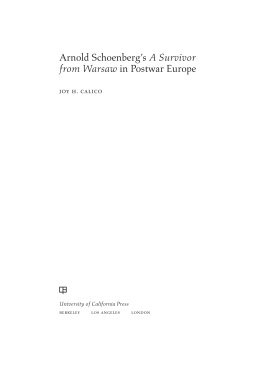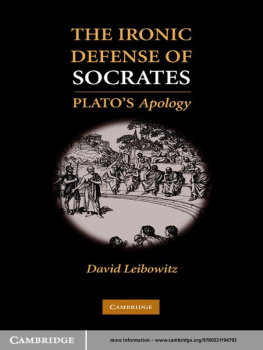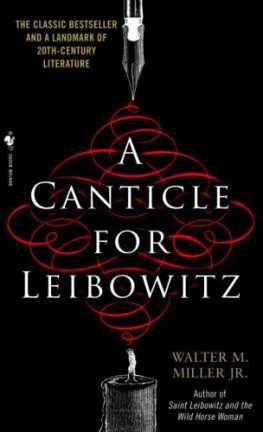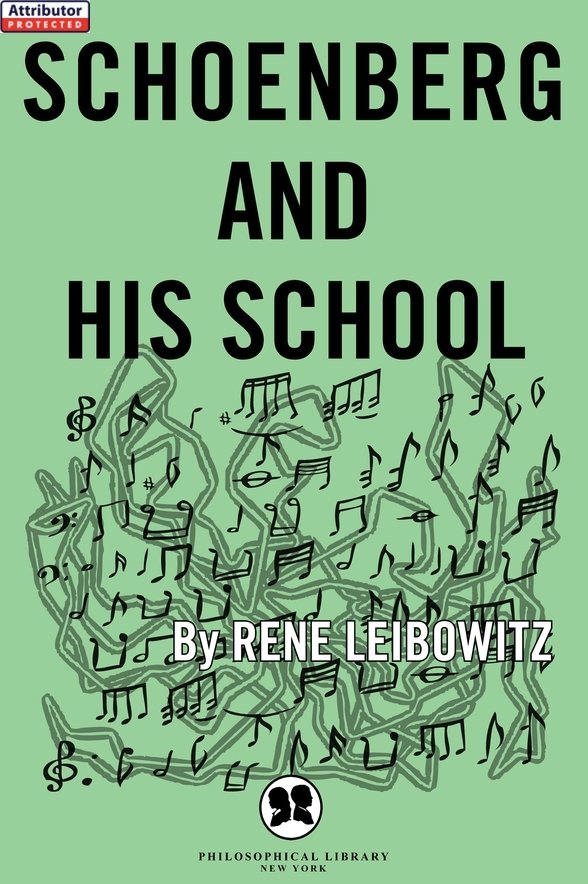Conclusion
The very struggle towards the heights is sufficient to satisfy a mans heart.
ALBERT CAMUS
Le Mythe de Sisyphe.
We have come to the conclusion of a work intended to familiarize the reader with what seems to us to be the keenest expression and the most important manifestation of the art of music in our time. We have tried to fulfill this task by analyzing, as thoroughly as possible, the works of the three great masters who determine the present state of music. We have considered these works from the double viewpoint of their specific acquisitions and of the tradition which is enriched by these acquisitions. Such an analysis surely imparts to our effort a certain logic, perhaps even a certain persuasive force. And yet it is evident that all the analyses and all the commentaries which fill these pages are insufficient, because they say nothing about what is really essential. How, indeed, could they make any claim to revivify the emotion, the extraordinary creative power, the tense striving to reach the summit of artistic activity, which produced every composition, every measure discussed in these pages? The admission of the ultimate impotence of any work of criticism is enough to strike despair to the heart of anyone who undertakes such a work in honest and clear-headed fashion. The uselessness, even the sterility of such a book as thisat least in its major ambition, which is to throw further light on its subjectbecomes even more obvious when one stops to consider that only those who want to be convinced are open to convictiononly those, indeed, who will some day come face to face with certain problems, book or no bookand that the influence which a theoretical work can exert on those who are not yet ready to grapple with these problems is, so to speak, nil.
But then what is to be done? Ought we to let the works speak for themselvesthese works which all in all can well afford to dispense with commentaries and justification, simply because their most eloquent justification is their existence? But these works are played very infrequently; and, when they are played, their unfamiliarity causes most of the listeners to miss their essential quality, and, far from retaining a strong and valid impression of them, to be confused and even irritated by works which they have not the slightest desire to hear again.
Certainly, we could content ourselves with a passive and resigned attitude; we could say that, since the value of these works is beyond discussion, they can waittheir value will impress itself on the world without our doing anything to force the issue. After all, a masterpiece is in no hurry; it transcends time; it can be misunderstood or ignoredall this is quite unimportant, and the time will come when its beauty will be revealed without any outside assistance.
Certainly! I often feel this way myselfthe more so as I know all too well how empty is the noisy and fashionable agitation of a great many musicians. In this sense, the silence which, up till now, has almost completely surrounded Schoenberg and his disciples, a silence which has protected them from fashion, snobbery and the like, not only honors them but perhaps even serves their interests.
But this silence has lasted long enough, and this is why.
We know what Schoenbergs activity means; we know the noble task which he has fulfilled. We have compared the musical situation created by this genius with that in which the genius of Bach unfolded. Like Bach, Schoenberg succeeded in a great renewal; for, just as the death of the modal system brought to life the tonal system, which was definitely constituted in the work of Bach, even so the classic tonal system, dead since Wagner, is transmuted, in Schoenbergs work, into the system which we have been trying to define.
But it is evident that such a renewal cannot take place without a violent reaction. In this respect, too, our time is exactly like the period which immediately followed Bach. His work, together with the theoretical formulations of Rameau, marks the culmination and the codification of the acquisitions of several centuries of musical activityprinciples which were to determine the entire musical evolution of the future. But let us remember the extreme impoverishment of music which then took place. Between 1750 (Bachs death) and about 1780 (burgeoning of the true genius of Haydn and Mozart) what has music to offer? On the one hand, a few successors of Bach, among whom only Johann Christian Bach, on account of his concessions to depraved public taste, acquired a certain reputation; on the other hand, some local schools like that of Mannheim, where, just as in the work of K. P. E. Bach, there are developed certain forms which perform the useful and necessary (if thankless and obscure) task of bridging the gap between Johann Sebastian Bach and Mozart. But what these thirty years principally have to offer us is that eyesore, the style galant, which depends on a number of pleasant and sterile formulae, and which therefore commands the entire allegiance of most musicians and music-lovers. Even Mozart and Haydn are contaminated for a long time by this style; they have to make a real effort to rid themselves of it and to establish a connection with an authentic musical tradition. For example, it was not until he rediscovered and applied the complex laws of Bachs polyphony that Mozart succeeded in attaining the level of his own genius.
This excursion into the past would doubtless be superfluous if it did not furnish us with the key to the contemporary musical situation. Just as the seriousness, austerity, and complexity of the art of Bach and Rameau finally exhausted the musicians and the public of 1750, about 1925 most musicians, and the public, turned aside from the difficult path of Schoenberg.
For, though that historic moment, exceptional from the viewpoint of the elaboration of certain polyphonic problems, which marks the beginning of this century seems to have favored the development of many powerful musicians fully aware of these problems, of all those who participated in this historic movement only a few had the courage to follow their experiments to the bitter end. Most of them, frightened by their own temerity, beat a speedy retreat. Now, it happens that the less glorious human actions are, the harder we try to justify them; that is why we have so many theories about the impasse in which certain pre-1914 experiments endedthe Back-to-Bach movement, as well as neo-classicism and neo-objectivism, which are neither classical, objective, nor neo.
There emerges from this pitiful debacle only the austere and clear-headed Arnold Schoenberg, surrounded by his faithful and no less clear-headed disciples, Alban Berg and Anton Webern. These men, whose whole life was love of and respect for genuine musical values, complete altruism, and repudiation of mediocrity, are a shining example only to those who care more for absolute truth than for the satisfaction of their personal cravings and the demands of the public. But the search for truth is attacked as a mere laboratory experiment; this well-worn formula completely satisfies most weak and lazy minds, which will ever defend their own petty interests against the menace of the supra-personal. Thus it becomes easy to have a clear conscience about giving in to ones predilection for facility and compromise, which is so well expressed in the style galant of our daya style which characterizes most of our composers, from Stravinsky and Hindemith down to those of the lowest rank, many of whom are tremendously successful. This success must be protected from anything which might endanger it. There is one sure way to protect itto join in a conspiracy of silence about the works of composers who express genuine musical values.

